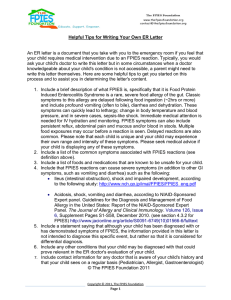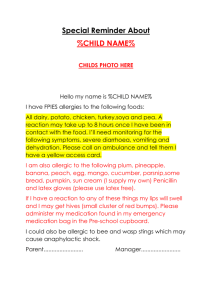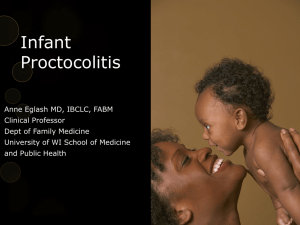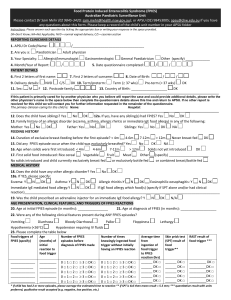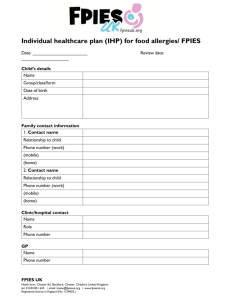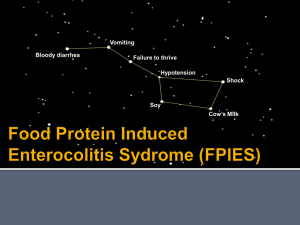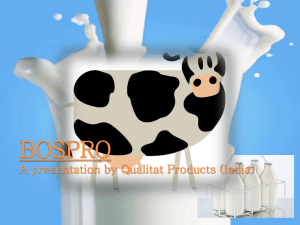Dear doctor
advertisement
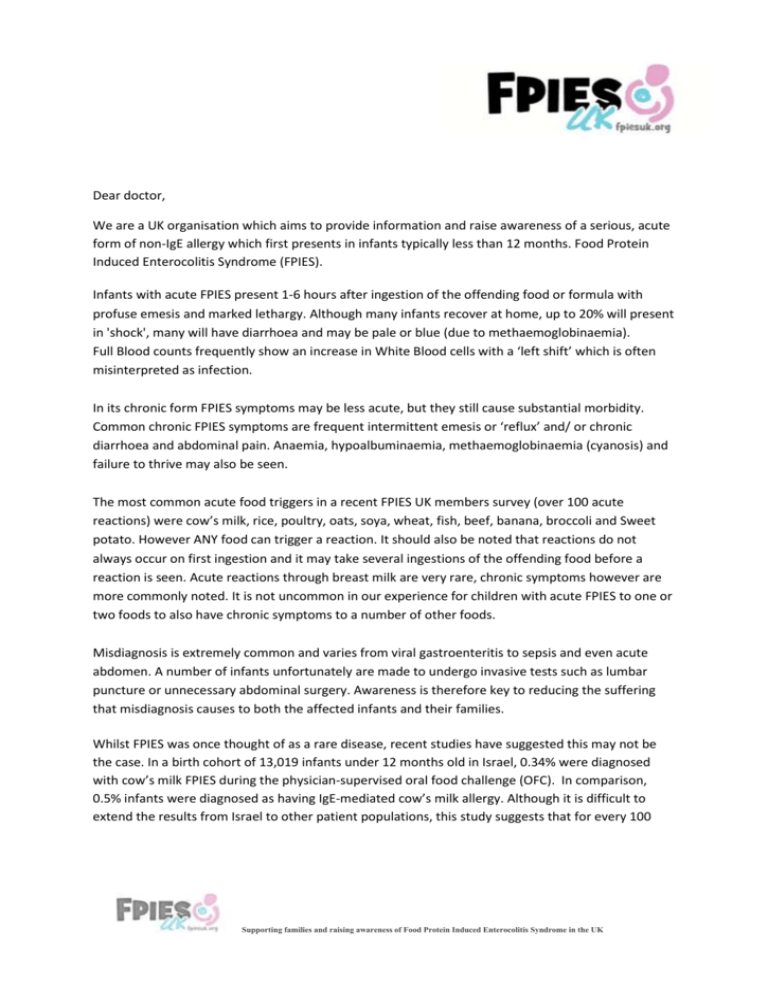
Dear doctor, We are a UK organisation which aims to provide information and raise awareness of a serious, acute form of non-IgE allergy which first presents in infants typically less than 12 months. Food Protein Induced Enterocolitis Syndrome (FPIES). Infants with acute FPIES present 1-6 hours after ingestion of the offending food or formula with profuse emesis and marked lethargy. Although many infants recover at home, up to 20% will present in 'shock', many will have diarrhoea and may be pale or blue (due to methaemoglobinaemia). Full Blood counts frequently show an increase in White Blood cells with a ‘left shift’ which is often misinterpreted as infection. In its chronic form FPIES symptoms may be less acute, but they still cause substantial morbidity. Common chronic FPIES symptoms are frequent intermittent emesis or ‘reflux’ and/ or chronic diarrhoea and abdominal pain. Anaemia, hypoalbuminaemia, methaemoglobinaemia (cyanosis) and failure to thrive may also be seen. The most common acute food triggers in a recent FPIES UK members survey (over 100 acute reactions) were cow’s milk, rice, poultry, oats, soya, wheat, fish, beef, banana, broccoli and Sweet potato. However ANY food can trigger a reaction. It should also be noted that reactions do not always occur on first ingestion and it may take several ingestions of the offending food before a reaction is seen. Acute reactions through breast milk are very rare, chronic symptoms however are more commonly noted. It is not uncommon in our experience for children with acute FPIES to one or two foods to also have chronic symptoms to a number of other foods. Misdiagnosis is extremely common and varies from viral gastroenteritis to sepsis and even acute abdomen. A number of infants unfortunately are made to undergo invasive tests such as lumbar puncture or unnecessary abdominal surgery. Awareness is therefore key to reducing the suffering that misdiagnosis causes to both the affected infants and their families. Whilst FPIES was once thought of as a rare disease, recent studies have suggested this may not be the case. In a birth cohort of 13,019 infants under 12 months old in Israel, 0.34% were diagnosed with cow’s milk FPIES during the physician-supervised oral food challenge (OFC). In comparison, 0.5% infants were diagnosed as having IgE-mediated cow’s milk allergy. Although it is difficult to extend the results from Israel to other patient populations, this study suggests that for every 100 Supporting families and raising awareness of Food Protein Induced Enterocolitis Syndrome in the UK infants with IgE mediate milk allergy there may be as many as 68 infants with cow’s milk FPIES. FPIES therefore is surely a more common condition than previously assumed. Diagnosis of FPIES is based on clinical symptoms and patient history, having excluded other possible differentials. Oral Food Challenges are considered high risk procedures in FPIES infants and should only be used when the clinical history is unclear or to establish when tolerance has been achieved. It is recommended that should an OFC be required it is conducted under close supervision in a hospital setting. Treatment of FPIES involves strict avoidance of the offending food, and slow cautious introduction of new foods. Those Infants who react to cow’s milk formula will likely need to be prescribed an amino acid based formula. Soya formula is not recommended as a cow’s milk substitute in these infants as up to 40% of those who react to cow’s milk also react to soya. Whilst there is no evidence to support the use of adrenaline or antihistamines in the treatment of FPIES, a recent study has shown that administration of IV or IM ondansetron during an acute reaction can lead to rapid resolution of symptoms. More research into the use of Ondansetron for FPIES is needed, but the results so far are promising. The prognosis for children with FPIES is very good with the majority of children outgrowing their triggers by 5 years of age. There are however a small number of teenagers with FPIES and FPIES to fish/ shellfish has been diagnosed in adults. I hope this short introduction to FPIES has given you an insight into the condition and its common presenting signs. Please take your time to read the further information provided in this pack and visit our website fpiesuk.org for up to date information and links to the most recent FPIES research. Also please visit iaffpe.org, the website of the International Association of Food Protein Induced Enterocolitis whom we are proud to have supporting us. We would appreciate it greatly if you could share this knowledge with your colleagues and coworkers. Increasing awareness is the key to prompt diagnosis and treatment. Kind Regards, Founder of FPIES UK FPIES UK is a charitable incorporated organisation registered in England and Wales. Charity No: 1159635 Email: enquiries@fpiesuk.org Supporting families and raising awareness of Food Protein Induced Enterocolitis Syndrome in the UK
